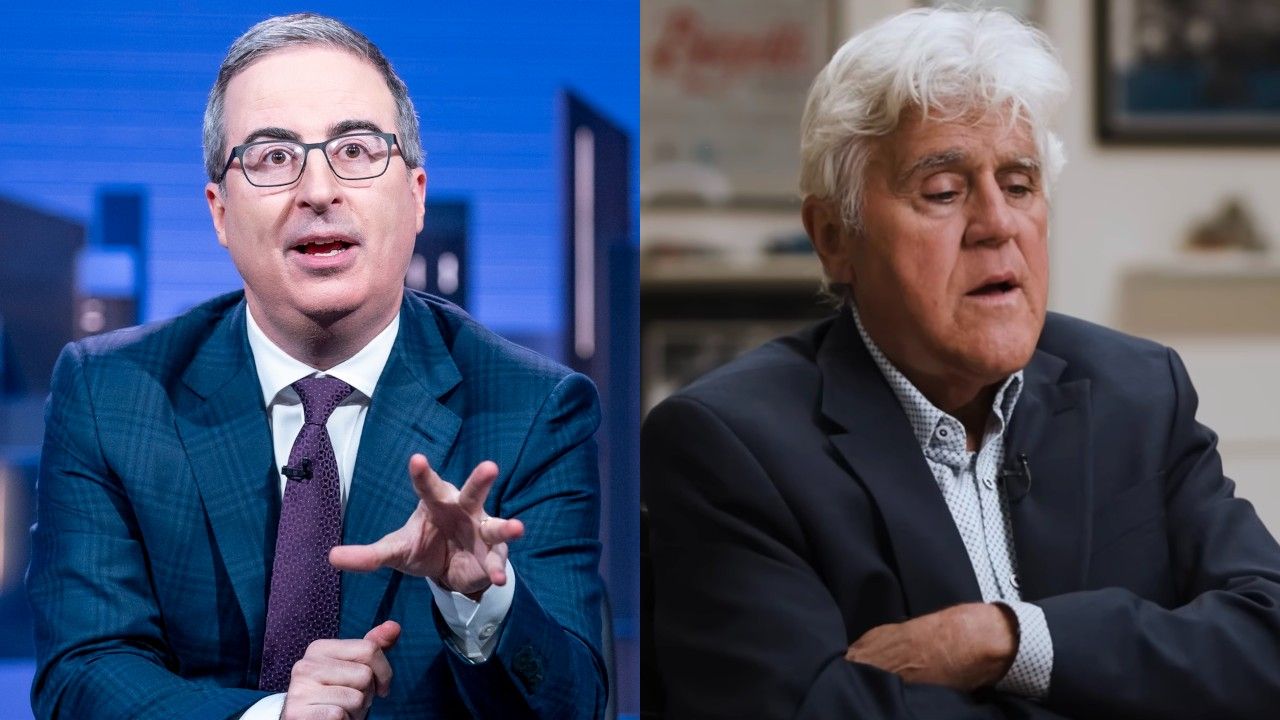
The cancellation of The Late Show with Stephen Colbert has added fuel to a discussion that’s persisted for some time now. Media personalities and journalists alike have been debating the future of the late night TV landscape. Someone who’s weighed in amid the conversations is veteran host Jay Leno, who specifically spoke to the presence of political humor within these kinds of shows. While Leno isn’t for hosts laying it on thick with politics, John Oliver has entered the chat, and he’s not holding back about why he disagrees.
When sharing his take on political humor, Jay Leno explained that while he does “love” it, he believes that hosts ultimately start “cozying too much” to a particular side. Leno doesn’t understand “why you would alienate one particular group” and doesn’t “think anybody wants to hear a lecture.” The veteran Tonight Show host was name-dropped during John Oliver’s interview with THR, and the Last Week Tonight headliner kicked off his thoughts with a direct statement:
I’m going to take a hard pass on taking comedic advice from Jay Leno.
Although Leno would touch upon political subject matter during his time as a host, John Oliver and many of his own contemporaries dive deeper. What’s worth mentioning is that Last Week Tonight is a satirical news program, whereas The Tonight Show is positioned more as a straightforward variety talk show. Nevertheless, hosts like Stephen Colbert, Jimmy Kimmel and Seth Meyers do provide political commentary, particularly during their opening monologues. When addressing Leno’s comments on alienation, Oliver had this to say:
Who thinks that way? Executives? Comedy can’t be for everyone. It’s inherently subjective. So, yeah, when you do stand-up, some people try to play to a broader audience, which is completely legitimate. Others decide not to, which is equally legitimate. I guess I don’t think it’s a question of what you should do because I don’t think comedy is prescriptive in that way. It’s just what people want.
On Last Week Tonight, John Oliver not only discusses politics, but he also doesn’t mind poking fun at corporate entities, including his own employers. He famously blasted his “business daddy,” Warner Bros. Discovery for canceling shows and making other criticized business decisions. Oliver even ripped into Disney and Hotstar due to a censorship situation in 2020. While Oliver approaches topics with biting humor and satire, for him, discussing political and societal subject matter isn’t about skewering a particular political party:
I think our show clearly comes from a point of view, but most of those long stories we do are not party political. They’re about systemic issues. Our last few shows were about gang databases, AI slop, juvenile justice, med spas, air traffic control. I’m not saying that these don’t have a point of view in them. Of course they do. But I hope a lot of them actually reach across people’s political persuasions. You want people to at least be able to agree on the problem, even if you disagree on what the solution to it is.
Stephen Colbert continues to discuss politics on his own show in the aftermath of CBS’ cancellation announcement, which came amid the completion of parent company Paramount’s Skydance merger. While the network said the decision to axe the show was purely “financial,” there are people who believe there are other reasons for it. More specifically, some think the move was tied to Paramount’s $16 million legal settlement with U.S. President Donald Trump, and that move had been openly criticized by Colbert.
Many continue to mourn the demise of The Late Show, which is set to end in May 2026. John Oliver joined the likes of Jimmy Kimmel and Bowen Yang in speaking out against the cancellation. And, as the late night landscape continues to evolve, time will tell if hosts continue to infuse politics into their content or gradually steer clear as Jay Leno suggests.







